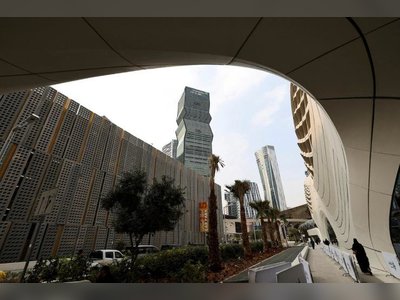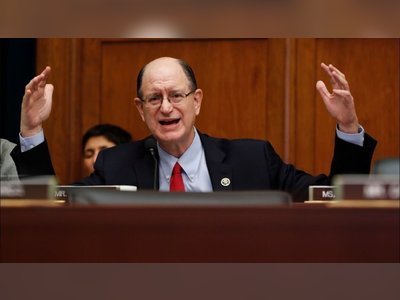
A US Charity Tied to the Supreme Court Offers Donors Access to the Justices
The Supreme Court Historical Society has raised more than $23 million in the last two decades, much of it from lawyers, corporations and special interests.
The Supreme Court Historical Society has raised more than $23 million in the last two decades, much of it from lawyers, corporations and special interests.
In some years, Chief Justice John G. Roberts Jr. does the honors. In others, it might be Justice Sonia Sotomayor or Justice Clarence Thomas presenting the squared-off hunks of marble affixed with the Supreme Court’s gilded seal.
Hewed from slabs left over from the 1930s construction of the nation’s high court and handed out in its magnificent Great Hall, they are a unique status symbol in a town that craves them. And while the ideological bents of the justices bestowing them might vary, there is one constant: All the recipients have given at least $5,000 to a charity favored by the justices, and, more often than not, the donors have a significant stake in the way the court decides cases.
The charity, the Supreme Court Historical Society, is ostensibly independent of the judicial branch of government, but in reality the two are inextricably intertwined. The charity’s stated mission is straightforward: to preserve the court’s history and educate the public about the court’s importance in American life. But over the years the society has also become a vehicle for those seeking access to nine of the most reclusive and powerful people in the nation. The justices attend the society’s annual black-tie dinner soirees, where they mingle with donors and thank them for their generosity, and serve as M.C.s to more regular society-sponsored lectures or re-enactments of famous cases.
The society has raised more than $23 million over the last two decades. Because of its nonprofit status, it does not have to publicly disclose its donors — and declined when asked to do so. But The New York Times was able to identify the sources behind more than $10.7 million raised since 2003, the first year for which relevant records were available.
At least $6.4 million — or 60 percent — came from corporations, special interest groups, or lawyers and firms that argued cases before the court, according to an analysis of archived historical society newsletters and publicly available records that detail grants given to the society by foundations. Of that, at least $4.7 million came from individuals or entities in years when they had a pending interest in a federal court case on appeal or at the high court, records show.
The donors include corporations like Chevron, which gave while embroiled in a 2021 Supreme Court case involving efforts by cities to hold the oil company accountable for its role in global warming. Veteran Supreme Court litigators gave while representing clients before the court that included Tyson Foods and the Ministry of Commerce of the People’s Republic of China.
Among the ideologically driven activists from both sides of the political aisle who donated to the society were the benefactors of an anti-abortion group whose leader instructed them to use the society’s annual dinners to meet and befriend conservative justices.
Virtually no one interviewed by The Times, including critics of the society’s fund-raising practices, said they believed that donations to the society had any bearing on cases before the justices. For one thing, many of the donors are already part of the Supreme Court’s insular and clubby world, where former clerks frequently socialize with and argue cases before their former bosses, and where the justices steadfastly refuse to televise their arguments and specifically reserve only a fraction of the court’s 439 seats for members of the public.
Carter G. Phillips, a Supreme Court litigator at Sidley Austin and the society’s treasurer, said it never occurred to him that anyone would use the society as a way to buy face time or favor with the justices, in part because the society’s events generally afford only fleeting contact with them.
“It’s one thing to go into the Oval Office because you spent $100 million on a campaign and get to talk substantively about the most important thing in the world to you,” he said, “as opposed to getting to go to a dinner or a lecture by a law professor on Marbury v. Madison where a justice might say a few words of introduction.”
But as polls show public approval of the court at an all-time low, amid widespread concern that the institution has become increasingly politicized, even some supporters said it might be time to rethink the Supreme Court Historical Society’s reliance on secretive private donations. The long-obscure society recently found itself in the spotlight after the anti-abortion leader, the Rev. Rob Schenck, told The Times how he had made the society and its events part of his campaign to embolden the justices to take unapologetic stands against abortion.
Charles Fried, who served as solicitor general in the Reagan administration and is now a professor at Harvard Law School, said he was so “horrified” by Mr. Schenck’s use of the society that he might no longer donate. And he said that, while he did not believe that donations influenced the justices, for the sake of appearances a charity so closely tied to the court should not solicit money from corporations and other special interests while they had matters before it.
“It’s disgusting,” he said. “Many of the people who contribute have the same reasons I do. You go to a cocktail party and support a good cause. But it turns out that for some people it’s not that innocent. And I think the justices are a victim of that.”
But David T. Pride, the executive director of the society from 1979 until he retired last year, defended the society’s practice of seeking donations from those with interests before the court, saying he “was pretty unabashed about it.”
“Who wouldn’t expect that to be our constituency?” he said. “I don’t think I would have taken money from the Communist or Nazi Parties, but within reason the society was open to all.”
The society was founded in 1974 by Chief Justice Warren E. Burger to make the court more welcoming to visitors and to restore dusty old portraits of justices of yore. Every chief justice since has served as its honorary chairman.
It publishes bound journals of Supreme Court history; restores, maintains and displays historically significant artifacts such as the robes of Justice Louis D. Brandeis; hosts lectures; and brings schoolteachers from around the country to Washington for an annual summer institute, where they learn about the court. Trustees of the nonprofit are expected to give at least $5,000 a year, “patrons” give between $12,500 and $25,000, and “benefactors” give more than $25,000.
Perhaps unsurprisingly, the historical society’s most significant source of identifiable funds — more than 34 percent — is the lawyers and law firms that practice before the Supreme Court, according to the Times analysis.
The chairman of the society’s board of trustees, Gregory P. Joseph, is a corporate litigator who served as the president of the American College of Trial Lawyers. Over the years, he and his firm have given at least $187,500 to the society, including in 2019, when he filed a submission with the court on behalf of the Sackler family, the longtime owners of Purdue Pharma, in a case involving accusations that they had siphoned billions of dollars out of the company in an attempt to deplete its coffers and limit the exposure the drugmaker faced over its deceptive marketing of OxyContin.
A number of other trustees who give regularly, such as Beth Brinkmann of Covington & Burling, served as Supreme Court clerks. Ms. Brinkmann joined the society’s board in 2006, and she was featured in the society’s newsletter in 2021 for giving at the patron level. Also in 2021, she represented power companies in the Supreme Court case West Virginia v. E.P.A., which limited the Environmental Protection Agency’s ability to regulate power plant emissions.
Corporate interests formed the next biggest category of donors, responsible for more than 15 percent of the total amount The Times was able to trace. Longtime donors include United Parcel Service, which has given $550,000 through its charitable foundation, including while the justices were considering a pregnancy discrimination case involving the company, Young v. United Parcel Service. AT&T, Home Depot, General Dynamics and Ford Motor Company are among other corporate donors that have given to the society, sometimes in years when they had cases before the court.
One way the society attracts such corporate largess is by courting top corporate lawyers with deep attachments to the court. Take Chevron, for instance. It began giving in 2010, the year after it hired R. Hewitt Pate, a former Supreme Court clerk and society trustee, as its general counsel. It has given every year since, for a total of $190,000, even as the Supreme Court heard a number of cases involving the company.
“We have given to the historical society in the spirit of furthering its stated mission of preserving the court’s history,” said a Chevron spokesman, Sean McCormack. “There is no other motivation.”
Another donor solicitation strategy involved bestowing special honors on the general counsels of major corporations. Martha Meehan-Cohen, a society employee who tracks the donations, said that the idea was to encourage the honorees’ employers to buy a table.
In 2013, the general counsels of Facebook and Time Warner were invited to attend the gala at the Plaza Hotel in New York. There, under a projected image of the Constitution, they were given the society’s first “Amicus Curiae Awards,” according to a society newsletter. That year, Facebook and Time Warner, through its various entities, donated at least a combined $50,000. This year, Kathryn Ruemmler, the general counsel of Goldman Sachs, received the award; Goldman Sachs, which had recently secured a Supreme Court victory making it harder for shareholders to mount class-action suits alleging securities fraud, donated $25,000.
Special interest advocacy groups accounted for about one out of every 10 dollars The Times could identify. Mr. Schenck said he encouraged not only his own donors to become trustees, but others in the anti-abortion movement as well. He couched it as a bargain, advising that $10,000 was enough to get noticed.
“I’ll warn you: There’s money involved,” he emailed one ally. “Societies like this begin from one starting point: Donor. It’s not as expensive as you think, though.”
In return, Mr. Pride, the longtime executive director of the society, did favors for Mr. Schenck and other donors, getting them coveted seats at oral arguments and arranging for face time with justices at society functions. In one email exchange with Jay Sekulow, a society trustee who as chief counsel for the conservative American Center for Law & Justice argued cases involving religious liberty and abortion before the court, Mr. Schenck wrote that Mr. Pride would make sure Mr. Sekulow was seated at a justice’s table at the annual dinner. “Maybe CJ’s table,” he added, referring to Chief Justice Roberts.
Mr. Pride said that “my job was to serve members of the society, and that was part of the service.”
(Mr. Schenck also told The Times that one of his donors, a society trustee, had shared advance notice of the outcome of a high-profile contraception case after dining at the home of Justice Samuel A. Alito Jr., the author of the opinion. Justice Alito and the trustee acknowledged sharing a meal and a friendship, but denied discussing confidential court business.)
Another top special interest donor is First Liberty Institute, a conservative nonprofit that also frequently litigates religious liberty cases before the justices. The institute, along with its employees and donors, gave a combined $217,500 from 2012 to 2022 while arguing before the court on behalf of clients such as a baker who refused to make cakes for gay couples. On the liberal side, special interest donors include the Boston Foundation, which advocates abortion rights. The Freedom Forum, which advocates First Amendment rights, was also a significant donor.
Mr. Phillips, the society’s treasurer, said he hoped that Mr. Schenck’s account and the subsequent scrutiny wouldn’t result in the justices’ distancing themselves from the society, which he said does important work in preserving the court’s history in much the same way that similar nonprofits preserve the history of the White House and the U.S. Capitol.
But Gabe Roth, the executive director of Fix the Court, an advocacy group critical of the court’s lack of transparency, said that if the court wants to preserve its history, it should do so itself by asking for a small appropriation from Congress.
In some years, Chief Justice John G. Roberts Jr. does the honors. In others, it might be Justice Sonia Sotomayor or Justice Clarence Thomas presenting the squared-off hunks of marble affixed with the Supreme Court’s gilded seal.
Hewed from slabs left over from the 1930s construction of the nation’s high court and handed out in its magnificent Great Hall, they are a unique status symbol in a town that craves them. And while the ideological bents of the justices bestowing them might vary, there is one constant: All the recipients have given at least $5,000 to a charity favored by the justices, and, more often than not, the donors have a significant stake in the way the court decides cases.
The charity, the Supreme Court Historical Society, is ostensibly independent of the judicial branch of government, but in reality the two are inextricably intertwined. The charity’s stated mission is straightforward: to preserve the court’s history and educate the public about the court’s importance in American life. But over the years the society has also become a vehicle for those seeking access to nine of the most reclusive and powerful people in the nation. The justices attend the society’s annual black-tie dinner soirees, where they mingle with donors and thank them for their generosity, and serve as M.C.s to more regular society-sponsored lectures or re-enactments of famous cases.
The society has raised more than $23 million over the last two decades. Because of its nonprofit status, it does not have to publicly disclose its donors — and declined when asked to do so. But The New York Times was able to identify the sources behind more than $10.7 million raised since 2003, the first year for which relevant records were available.
At least $6.4 million — or 60 percent — came from corporations, special interest groups, or lawyers and firms that argued cases before the court, according to an analysis of archived historical society newsletters and publicly available records that detail grants given to the society by foundations. Of that, at least $4.7 million came from individuals or entities in years when they had a pending interest in a federal court case on appeal or at the high court, records show.
The donors include corporations like Chevron, which gave while embroiled in a 2021 Supreme Court case involving efforts by cities to hold the oil company accountable for its role in global warming. Veteran Supreme Court litigators gave while representing clients before the court that included Tyson Foods and the Ministry of Commerce of the People’s Republic of China.
Among the ideologically driven activists from both sides of the political aisle who donated to the society were the benefactors of an anti-abortion group whose leader instructed them to use the society’s annual dinners to meet and befriend conservative justices.
Virtually no one interviewed by The Times, including critics of the society’s fund-raising practices, said they believed that donations to the society had any bearing on cases before the justices. For one thing, many of the donors are already part of the Supreme Court’s insular and clubby world, where former clerks frequently socialize with and argue cases before their former bosses, and where the justices steadfastly refuse to televise their arguments and specifically reserve only a fraction of the court’s 439 seats for members of the public.
Carter G. Phillips, a Supreme Court litigator at Sidley Austin and the society’s treasurer, said it never occurred to him that anyone would use the society as a way to buy face time or favor with the justices, in part because the society’s events generally afford only fleeting contact with them.
“It’s one thing to go into the Oval Office because you spent $100 million on a campaign and get to talk substantively about the most important thing in the world to you,” he said, “as opposed to getting to go to a dinner or a lecture by a law professor on Marbury v. Madison where a justice might say a few words of introduction.”
But as polls show public approval of the court at an all-time low, amid widespread concern that the institution has become increasingly politicized, even some supporters said it might be time to rethink the Supreme Court Historical Society’s reliance on secretive private donations. The long-obscure society recently found itself in the spotlight after the anti-abortion leader, the Rev. Rob Schenck, told The Times how he had made the society and its events part of his campaign to embolden the justices to take unapologetic stands against abortion.
Charles Fried, who served as solicitor general in the Reagan administration and is now a professor at Harvard Law School, said he was so “horrified” by Mr. Schenck’s use of the society that he might no longer donate. And he said that, while he did not believe that donations influenced the justices, for the sake of appearances a charity so closely tied to the court should not solicit money from corporations and other special interests while they had matters before it.
“It’s disgusting,” he said. “Many of the people who contribute have the same reasons I do. You go to a cocktail party and support a good cause. But it turns out that for some people it’s not that innocent. And I think the justices are a victim of that.”
But David T. Pride, the executive director of the society from 1979 until he retired last year, defended the society’s practice of seeking donations from those with interests before the court, saying he “was pretty unabashed about it.”
“Who wouldn’t expect that to be our constituency?” he said. “I don’t think I would have taken money from the Communist or Nazi Parties, but within reason the society was open to all.”
The society was founded in 1974 by Chief Justice Warren E. Burger to make the court more welcoming to visitors and to restore dusty old portraits of justices of yore. Every chief justice since has served as its honorary chairman.
It publishes bound journals of Supreme Court history; restores, maintains and displays historically significant artifacts such as the robes of Justice Louis D. Brandeis; hosts lectures; and brings schoolteachers from around the country to Washington for an annual summer institute, where they learn about the court. Trustees of the nonprofit are expected to give at least $5,000 a year, “patrons” give between $12,500 and $25,000, and “benefactors” give more than $25,000.
Perhaps unsurprisingly, the historical society’s most significant source of identifiable funds — more than 34 percent — is the lawyers and law firms that practice before the Supreme Court, according to the Times analysis.
The chairman of the society’s board of trustees, Gregory P. Joseph, is a corporate litigator who served as the president of the American College of Trial Lawyers. Over the years, he and his firm have given at least $187,500 to the society, including in 2019, when he filed a submission with the court on behalf of the Sackler family, the longtime owners of Purdue Pharma, in a case involving accusations that they had siphoned billions of dollars out of the company in an attempt to deplete its coffers and limit the exposure the drugmaker faced over its deceptive marketing of OxyContin.
A number of other trustees who give regularly, such as Beth Brinkmann of Covington & Burling, served as Supreme Court clerks. Ms. Brinkmann joined the society’s board in 2006, and she was featured in the society’s newsletter in 2021 for giving at the patron level. Also in 2021, she represented power companies in the Supreme Court case West Virginia v. E.P.A., which limited the Environmental Protection Agency’s ability to regulate power plant emissions.
Corporate interests formed the next biggest category of donors, responsible for more than 15 percent of the total amount The Times was able to trace. Longtime donors include United Parcel Service, which has given $550,000 through its charitable foundation, including while the justices were considering a pregnancy discrimination case involving the company, Young v. United Parcel Service. AT&T, Home Depot, General Dynamics and Ford Motor Company are among other corporate donors that have given to the society, sometimes in years when they had cases before the court.
One way the society attracts such corporate largess is by courting top corporate lawyers with deep attachments to the court. Take Chevron, for instance. It began giving in 2010, the year after it hired R. Hewitt Pate, a former Supreme Court clerk and society trustee, as its general counsel. It has given every year since, for a total of $190,000, even as the Supreme Court heard a number of cases involving the company.
“We have given to the historical society in the spirit of furthering its stated mission of preserving the court’s history,” said a Chevron spokesman, Sean McCormack. “There is no other motivation.”
Another donor solicitation strategy involved bestowing special honors on the general counsels of major corporations. Martha Meehan-Cohen, a society employee who tracks the donations, said that the idea was to encourage the honorees’ employers to buy a table.
In 2013, the general counsels of Facebook and Time Warner were invited to attend the gala at the Plaza Hotel in New York. There, under a projected image of the Constitution, they were given the society’s first “Amicus Curiae Awards,” according to a society newsletter. That year, Facebook and Time Warner, through its various entities, donated at least a combined $50,000. This year, Kathryn Ruemmler, the general counsel of Goldman Sachs, received the award; Goldman Sachs, which had recently secured a Supreme Court victory making it harder for shareholders to mount class-action suits alleging securities fraud, donated $25,000.
Special interest advocacy groups accounted for about one out of every 10 dollars The Times could identify. Mr. Schenck said he encouraged not only his own donors to become trustees, but others in the anti-abortion movement as well. He couched it as a bargain, advising that $10,000 was enough to get noticed.
“I’ll warn you: There’s money involved,” he emailed one ally. “Societies like this begin from one starting point: Donor. It’s not as expensive as you think, though.”
In return, Mr. Pride, the longtime executive director of the society, did favors for Mr. Schenck and other donors, getting them coveted seats at oral arguments and arranging for face time with justices at society functions. In one email exchange with Jay Sekulow, a society trustee who as chief counsel for the conservative American Center for Law & Justice argued cases involving religious liberty and abortion before the court, Mr. Schenck wrote that Mr. Pride would make sure Mr. Sekulow was seated at a justice’s table at the annual dinner. “Maybe CJ’s table,” he added, referring to Chief Justice Roberts.
Mr. Pride said that “my job was to serve members of the society, and that was part of the service.”
(Mr. Schenck also told The Times that one of his donors, a society trustee, had shared advance notice of the outcome of a high-profile contraception case after dining at the home of Justice Samuel A. Alito Jr., the author of the opinion. Justice Alito and the trustee acknowledged sharing a meal and a friendship, but denied discussing confidential court business.)
Another top special interest donor is First Liberty Institute, a conservative nonprofit that also frequently litigates religious liberty cases before the justices. The institute, along with its employees and donors, gave a combined $217,500 from 2012 to 2022 while arguing before the court on behalf of clients such as a baker who refused to make cakes for gay couples. On the liberal side, special interest donors include the Boston Foundation, which advocates abortion rights. The Freedom Forum, which advocates First Amendment rights, was also a significant donor.
Mr. Phillips, the society’s treasurer, said he hoped that Mr. Schenck’s account and the subsequent scrutiny wouldn’t result in the justices’ distancing themselves from the society, which he said does important work in preserving the court’s history in much the same way that similar nonprofits preserve the history of the White House and the U.S. Capitol.
But Gabe Roth, the executive director of Fix the Court, an advocacy group critical of the court’s lack of transparency, said that if the court wants to preserve its history, it should do so itself by asking for a small appropriation from Congress.











